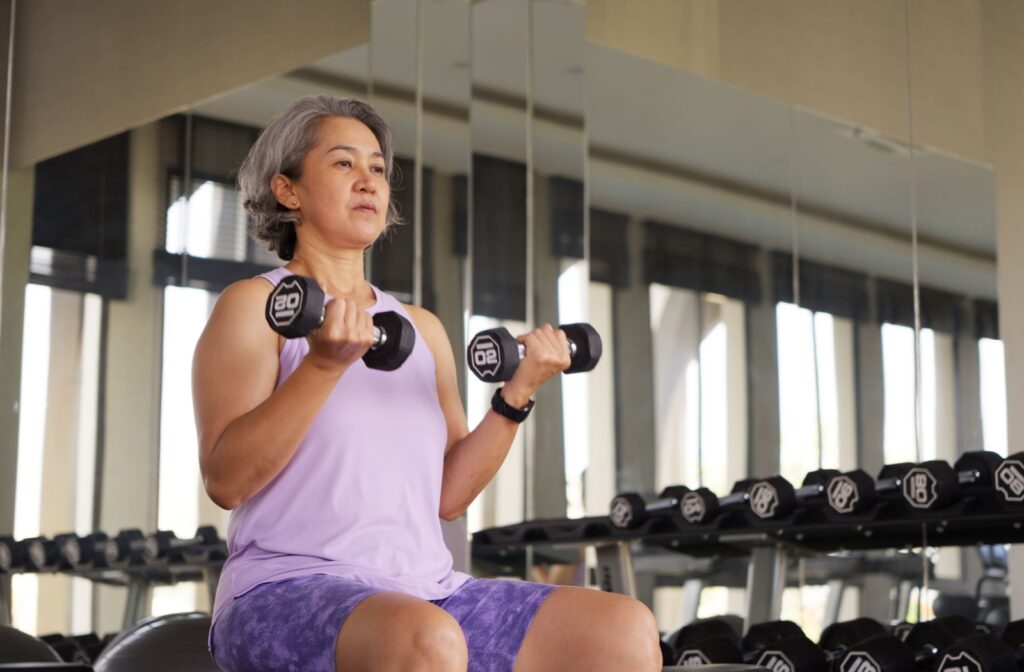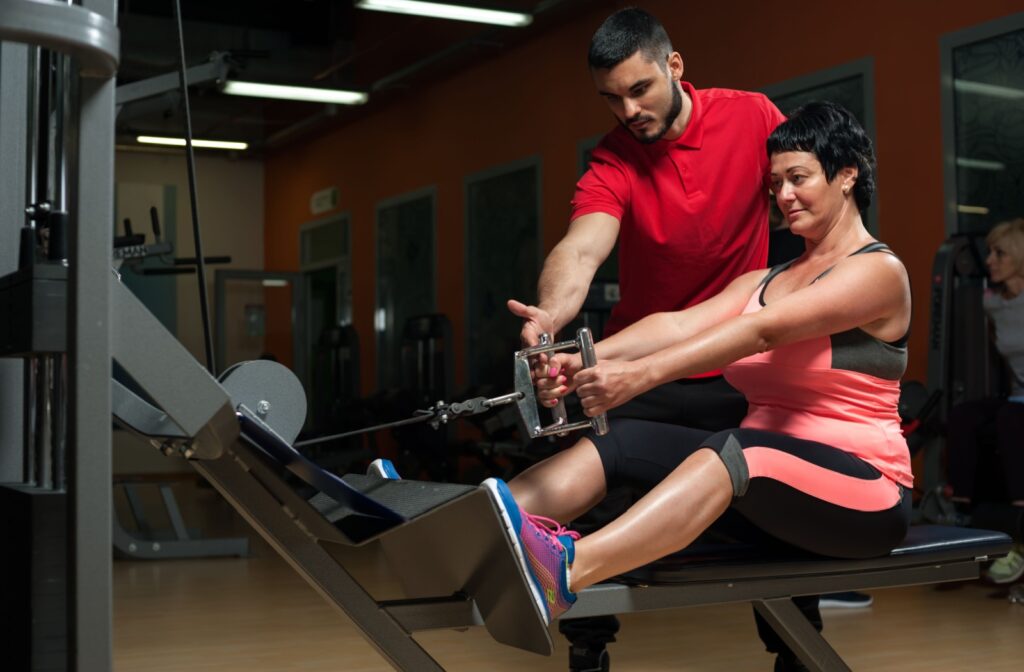
The fatigue that comes with perimenopause can feel overwhelming. It’s a deep, persistent tiredness that sleep doesn’t always resolve, making even simple tasks feel like a challenge. You may wonder how you can possibly add exercise to your plate when you barely have the energy to get through the day.
While it seems backward, the right kind of physical activity is a powerful tool to manage this phase of life. Specifically, a consistent resistance exercise routine can help you build more energy, protect your body, and navigate the hormonal shifts associated with life stages like menopause.
It gives you a way to actively fight back against fatigue and feel more in control.
The Perimenopause Shift & Why You Feel So Tired
Perimenopause is a transitional stage where your hormone levels, especially estrogen, begin to fluctuate. This shift is the root cause of many of the changes you experience, with profound fatigue being one of the most common.
Beyond the well-known hot flashes, this transition can bring about a collection of other symptoms. Many of these issues are interconnected and can contribute to a general feeling of being unwell or simply “off.” You might experience:
- Persistent fatigue or low energy
- Changes in mood or increased anxiety
- Poor sleep quality
- Loss of muscle mass, a process known as age-related sarcopenia
- Brain fog or difficulty concentrating
Why Resistance Exercise Fights Perimenopause Fatigue
It’s understandable to want to rest when you feel drained. However, targeted exercise creates a positive cycle that generates more energy. Resistance training is therefore a powerful tool that directly addresses many perimenopause symptoms at their source.
Build More Energy
When you build stronger muscles, you improve both your metabolism and how your body uses fuel. This increased efficiency means you have more energy available for your daily life. A regular strength training routine can help you feel more awake and capable.
Protect Your Bones & Muscles
As your estrogen levels decline, you can lose both muscle mass and bone density. Resistance training places a healthy demand on your body, encouraging it to build and maintain strong muscles and bones. This can help reduce the long-term risk of osteoporosis, a common concern as we age.
Support Your Mood & Hormones
Exercise prompts your body to release endorphins, which are natural mood elevators. A regular strength routine can also have a positive influence on the hormonal shifts you’re experiencing.
In fact, studies show that strength training can improve symptoms of depression, providing a powerful mental boost that helps you feel more stable and balanced from one day to the next.
What Type of Workout Is Best for Perimenopause?
All movement is beneficial, and every step you take is a positive one for your health. But when it comes to effectively managing symptoms of perimenopause, some forms of exercise can deliver more significant results.
To combat muscle loss and fatigue, a program focused on building foundational strength by lifting weights can give you the most benefit.
The Power of Progressive Resistance
Progressive resistance simply means gradually challenging your muscles over time. It’s not about spending hours in a gym, it’s about consistent, focused effort that leads to real strength gains. Progressive resistance training tells your body that it needs to adapt and become stronger.
Why Some Activities May Not Be Enough
Activities like yoga, walking, and pilates are excellent for your mental health, flexibility, and mobility. They should be a part of your wellness routine. However, they typically don’t provide the targeted stimulus needed to significantly increase muscle mass or bone density on their own.
The Importance of Heavy Weights
The term “heavy” is personal. Simply put, lifting heavy weights means the final few repetitions are nearing or reaching your maximum effort, with perfect form. This is best performed under the guidance of an experienced trainer who can motivate and guide you through those ‘2 more reps’. This is achievable for people of any age; from 12 to 92.
This challenge is the signal that tells your bones and muscles to get stronger. It’s also important to remember that strength training is safe when done with proper technique, helping you to maximize the benefits while minimizing the risks.

How to Start When You Feel Exhausted
The thought of exercise can be draining when you’re already tired. The key is to break the cycle by starting small. A little bit of the right kind of activity will create more energy, not less.
Start with Just 1 Session a Week
You don’t need to commit to a demanding schedule right away. One focused resistance training session per week is an excellent way to begin. This approach keeps it manageable, helps you build the habit, and allows your body to adapt and recover properly.
Focus on Quality over Quantity
A short, well-structured workout is more effective than a long, unfocused one, proving that more isn’t always better when it comes to exercise. Prioritize good form and a few challenging exercises over trying to do too much. Working with a personal trainer can provide expert guidance on form and session structure to make your time more efficient.
Listen to Your Body & Recover
Your body builds strength during rest, not just during the workout itself. Make sure you schedule recovery days between your strength training sessions. Gentle movement like walking is great for active recovery, but you should also give yourself permission to rest completely when you need it.
Find Success with a Personalized Approach
Doing challenging work requires the right support system. To get the results you want safely and effectively, you need focus, a suitable environment, and professional guidance. A personalized plan helps you achieve your goals without the guesswork.
The Value of Expert Guidance
A formally educated and certified personal trainer can design a program based on your unique needs and goals. They can show you how to perform exercises correctly and adjust the plan as you get stronger. This personalized client programming helps you make steady progress and stay motivated.
The Right Environment for Focus & Effort
A dedicated space with the proper equipment helps you concentrate on your workout without distractions. Commercial gyms can be overwhelming. A supportive, private environment is exactly what makes OneUp Fitness different, and it can make a huge difference in your ability to put in the effort required for change.
How to Thrive in This New Chapter
You can feel powerful and capable through perimenopause and beyond. A proactive approach and the right support can make all the difference. An evidence-based program and guidance from professionals who offer personal training in Halifax and Bedford can give you the tools you need to thrive.
Perimenopause is a significant transition, but it doesn’t have to be defined by fatigue. By incorporating resistance training into your life, you can actively build the strength and energy needed to feel your best. It’s about taking small, powerful steps toward long-term well-being.
At OneUp Fitness, we provide a focused, one-on-one environment for just that. Contact us to learn how we can create a plan that works for you.





